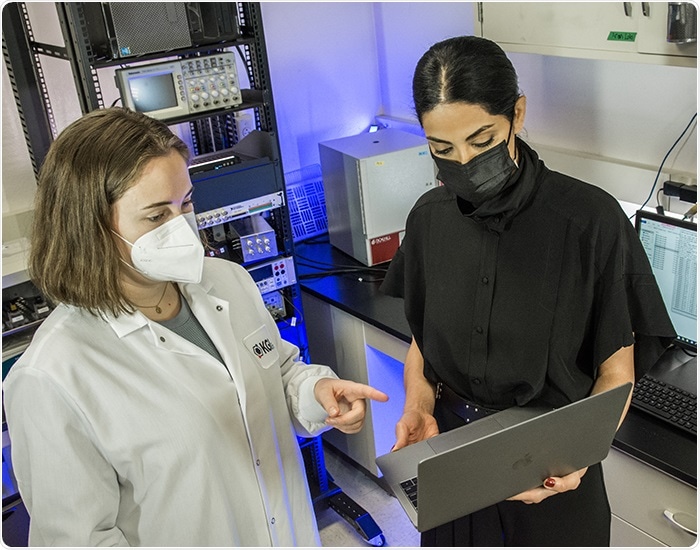The CRISPR-Chip technology was first introduced in 2019 by Dr. Kiana Aran, an Assistant Professor at Keck Graduate Institute (KGI) and a Visiting Scientist at the University of California, Berkeley.

Image Credit: Keck Graduate Institute.
Only two years later, she has now scaled up its application to develop CRISPR-SNP-Chip, which allows the detection of single-point mutations without the need to amplify in Amyotrophic lateral sclerosis (ALS) and Sickle Cell Disease.
The field of CRISPR-based diagnostics is rapidly evolving due to CRISPR programmability and ease of use. However, the majority of CRISPR-based diagnostics platforms are still relying on target amplifications or optical detections. The reprogrammability of CRISPR combined with optics-free highly scalable graphene transistors will allow us to bring the diagnostics power of the CRISPR to its full potential.”
Dr Kiana Aran, Assistant Professor, Keck Graduate Institute
“The ability to detect single nucleotide polymorphisms (SNPs) is at the core of human health genetics but detection of SNPs is also very important in pharmacology and agriculture, and is a driving force in evolutionary change such as mutations conferring resistance to antibiotics. Eliminating the need for amplification and optics will make SNP genotyping readily accessible,” added Dr. Aran.
Aran headed the group of researchers behind the study described in the paper titled “CRISPR-based Transistors for Amplification-free Electronic Detection of Single Point Mutations,” which was published on April 5th, 2021, in the Nature Biomedical Engineering journal. It was a joint effort between KGI, Cardea Bio, UC Berkeley, Vilnius University, UC Irvine, and CasZyme.
The SNP-Chip technology is an advancement of the CRISPR-Chip™, a technology that was reported earlier and can detect large insertion and deletions. In June 2019, it was featured on the cover of Nature Biomedical Engineering.
This time, the researchers used graphene transistors along with certain versions of CAS enzymes and gRNA designs, monitoring several different electrical signals received from graphene transistors to develop a new version of CRISPR-Chip™, which eventually allowed SNP detection without the need to amplify. The newly created CRISPR-Chip set, known as SNP-Chip, is another huge breakthrough in reshaping nucleic-acid-based detection methods.
Merging a diversity of CRISPR-Cas biology with electronics via Cardean Transistors opens up a whole new range of possibilities for diagnostic applications. Using the Cas9 orthologue for SNP detection is just the tip of the iceberg.”
Dr Virginjus Siksnys, Founder and Chairman, CasZyme Management Board
Dr. Siksnys is also the co-author of the study and a professor at Vilnius University, Lithuania.
This paper validated the utility of SNP-Chip for testing SNP mutation in samples received from patients who have Sickle Cell Disease and ALS. In both the clinical models, the platform could differentiate between healthy and mutated genes within the entire human genome without the need to amplify and by mere swapping of gRNA to target preferred DNA sequences. This suggests the ease of reconfiguring the platform for various DNA targets.
SNP-Chip exhibits the capability to highly influence basic research and medical diagnostics as it can drastically reduce the cost and time involved in SNP genotyping, track the efficiency of gRNA designs, and enable the quality control process for CRISPR-based gene editing.
SNP-Chip’s digital, direct, rapid, and accurate SNP analysis will revolutionize the screening for genetic mutations. This new technology will inform the discovery of processes underlying disease and aging and will enable faster, more effective clinical translation.”
Irina Conboy, PhD, Study Co-Author and Professor of Bioengineering, UC Berkeley
The detection of a target gene with single nucleotide mismatch specificity without amplification can help simplify genetic research and diagnostics. Moreover, it can offer more versatility for biosensing applications that were earlier restricted to a laboratory setting.
CRISPR-SNP-Chip Enables Amplification-Free Electronic Detection of Single Point Mutations
Video Credit: Keck Graduate Institute.
Source:
Journal reference:
Balderston, S., et al. (2021) Discrimination of single-point mutations in unamplified genomic DNA via Cas9 immobilized on a graphene field-effect transistor. Nature Biomedical Engineering. doi.org/10.1038/s41551-021-00706-z.